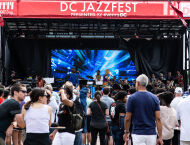Music

Bob Dylan Captures That Old Feeling at Wolf Trap
July 6, 2016 @ 12:00am
How do you keep moving forward? It is a question that plagues every artist, no matter what stage they’re at in their respective careers. If you’re Bob Dylan, the most celebrated songwriter of the rock era and an international icon, the answer is an interesting one. You move backwards, and in Dylan’s case, that involves going all the way back.
Back to what? The golden age of American songwriting – the time when countless song peddlers of Tin Pan Alley alongside figures like the Gershwins, Cole Porter and Irving Berlin enraptured pre-Cold War cities with stories of romance, nostalgia and the finer things in life. Their works fill The Great American Songbook, and Bob Dylan drew from this canon for his last two studio albums, and for his performances at Wolf Trap’s Filene Center this week.
On this stop of the “Never Ending Tour,” vocal standards made famous by singers like Frank Sinatra and Nat King Cole were peppered into a set that spanned Dylan’s career, yet focused on his last three albums: Fallen Angels, Shadows in the Night and Tempest. Songs that were originally composed for the Broadway stage or a New York nightclub might seem out of place amongst Dylan’s reflective, acerbic poeticism, yet fit quite snuggly with them.
Where more traditional arrangements of standards like “All or Nothing at All” or “That Old Feeling” usually reflect the songwriter’s cosmopolitan aspirations, Dylan and his band filtered the 1940s songs into a sound that meets somewhere between downtown and the Dust Bowl in the vast American musical landscape. In fact, there’s a certain jazz quality that underlined many of the songs Dylan and his band performed on Tuesday night. Steamboat swing shone through in “Duquesne Whistle,” swamp blues simmered in “Early Roman Kings,” and Donnie Herron’s pedal and lap steel guitars added a kind of classic yet refined 1940s sound to the 2016 arrangements of both originals and standards.
Like Rod Stewart’s The Great American Songbook Collection albums showed, the gravelly voice of an elder rock statesman lends itself surprisingly well to songs usually recorded by virile, romantic young singers like Frank Sinatra or Bing Crosby. In Dylan’s case, his gravel and disposition truly carried the nostalgia of these songs like few other performers could. When he croaked, “There’ll be no new romance for me, it’s foolish to start” from “That Old Feeling,” the words came with a weight and wisdom that conjured all the ache and pain that the song has meant to thousands of lovers – old and young – over the decades.
Those who go seeking the Freewheelin’ Bob Dylan at his more recent shows will be disappointed – but they’d also have been disappointed by his live performances for the last 50 some years. Dylan hung up his “voice of the counterculture” hat as soon as the hipsters of the Village thrust it on his head. In fact, the only “original era” song he played was a steady rolling version of “Blowing in The Wind” in the encore. Surely in this age of ultimate political and social unrest, the great Bob Dylan would be moved to speak?
Well, that’s missing the point of Dylan today. He stands less for counterculture and more for ultimate culture: for craft, quality and excellence. Even though watching him perform is a bit like watching Shakespeare – it takes a few minutes to begin to understand his aged warble – his performance at Wolf Trap represented the power of persistence: the persistence of Bob Dylan, rock’s poet laureate, his own songs and the captivating power of The Great American Songbook. Dylan has spent the last five plus decades writing his own great American songbook – he deserves to sit down and enjoy another one from time to time.
Photo: Courtesy of Wolf Trap







